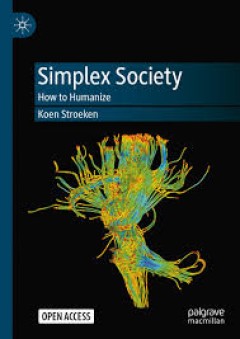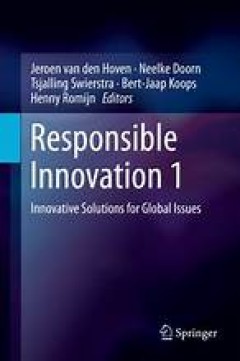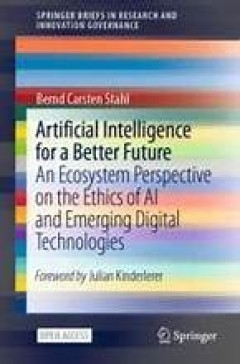Filter by

Precision Oncology and Cancer Biomarkers: Issues at Stake and Matters of Concern
This open access book reflects on matters of social and ethical concern raised in the daily practices of those working in and around precision oncology. Each chapter addresses the experiences, concerns and issues at stake for people who work in settings where precision oncology is practiced, enacted, imagined or discussed. It subsequently discusses and analyses bioethical dilemmas, scientific c…
- Edition
- 1
- ISBN/ISSN
- -
- Collation
- -
- Series Title
- Human Perspectives in Health Sciences and Technology
- Call Number
- XIV, 281

Simplex Society: How to Humanize
This open access book provides thought-provoking anthropology grounded in comparative ethnography. The theory captures the current historical moment, the long-term trends that led us here, and the prospects for a humane future. The experience of complexity characterizing a globalized information society triggers simplexes. These unidimensional responses instrumental in bringing about a predicta…
- Edition
- -
- ISBN/ISSN
- 978-3-031-41115-1
- Collation
- X, 320
- Series Title
- -
- Call Number
- -

Cow Care in Hindu Animal Ethics
This open access book provides both a broad perspective and a focused examination of cow care as a subject of widespread ethical concern in India, and increasingly in other parts of the world. In the face of what has persisted as a highly charged political issue over cow protection in India, intellectual space must be made to bring the wealth of Indian traditional ethical discourse to bear on t…
- Edition
- 1
- ISBN/ISSN
- 978-3-030-28408-4
- Collation
- -
- Series Title
- The Palgrave Macmillan Animal Ethics Series
- Call Number
- XXX, 269

A Philosophical Examination of Social Justice and Child Poverty
This book is open access under a CCBY license. This book investigates child poverty from a philosophical perspective. It identifies the injustices of child poverty, relates them to the well-being of children, and discusses who has a moral responsibility to secure social justice for children.
- Edition
- 1
- ISBN/ISSN
- 978-1-137-42602-4
- Collation
- -
- Series Title
- -
- Call Number
- VII, 193

Cyborgs in Latin America
A PDF version of this book is available for free in open access via the OAPEN Library platform, www.oapen.org . Cyborgs in Latin America explores the ways cultural expression in Latin America has grappled with the changing relationships between technology and human identity.
- Edition
- 1
- ISBN/ISSN
- 978-0-230-10977-3
- Collation
- -
- Series Title
- -
- Call Number
- XI, 212

World Class Universities
This open access book focuses on the dimensions of the discourse of 'The World Class University', its alleged characteristics, and its policy expressions. It offers a broad overview of the historical background and current trajectory of the world-class-university construct. It also deepens the theoretical discussion, and points a way forward out of present impasses resulting from the pervasive …
- Edition
- 1
- ISBN/ISSN
- 978-981-15-7598-3
- Collation
- -
- Series Title
- Evaluating Education: Normative Systems and Institutional Practices Evaluating Education: Normative Systems and Institutional Practices
- Call Number
- X, 289

Responsible Innovation 1
This book addresses the methodological issues involved in responsible innovation and provides an overview of recent applications of multidisciplinary research. Responsible innovation involves research into the ethical and societal aspects of new technologies (e.g. ICT, nanotechnology, biotechnology and brain sciences) and of changes in technological systems (e.g. energy, transport, agriculture …
- Edition
- 1
- ISBN/ISSN
- 978-94-017-8956-1
- Collation
- -
- Series Title
- 26 b/w illustrations
- Call Number
- XXIII, 392

Artificial Intelligence for a Better Future
This open access book proposes a novel approach to Artificial Intelligence (AI) ethics. AI offers many advantages: better and faster medical diagnoses, improved business processes and efficiency, and the automation of boring work. But undesirable and ethically problematic consequences are possible too: biases and discrimination, breaches of privacy and security, and societal distortions such as…
- Edition
- 1
- ISBN/ISSN
- 978-3-030-69978-9
- Collation
- -
- Series Title
- SpringerBriefs in Research and Innovation Governance
- Call Number
- X, 124

Reimagining Sustainable Organization
This open access book reimagines a deeper sustainability in dynamic organization. Offering multiple perspectives on arts, design thinking, leadership, knowledge and project management, Reimagining Sustainable Organization addresses our need for thinking and coping differently when facing the many unknowns of real-life enterprises in society. Drawing on process philosophy, real-world case stu…
- Edition
- -
- ISBN/ISSN
- 978-3-030-96210-4
- Collation
- -
- Series Title
- -
- Call Number
- -

Applying Reflective Equilibrium
This open access book provides the first explicit case study for an application of the method of reflective equilibrium (RE), using it to develop and defend a precautionary principle. It thereby makes an important and original contribution to questions of philosophical method and methodology. The book shows step-by-step how RE is applied, and develops a methodological framework which will be us…
- Edition
- 1
- ISBN/ISSN
- 978-3-031-04333-8
- Collation
- -
- Series Title
- Logic, Argumentation & Reasoning
- Call Number
- XI, 273
 Computer Science, Information & General Works
Computer Science, Information & General Works  Philosophy & Psychology
Philosophy & Psychology  Religion
Religion  Social Sciences
Social Sciences  Language
Language  Pure Science
Pure Science  Applied Sciences
Applied Sciences  Art & Recreation
Art & Recreation  Literature
Literature  History & Geography
History & Geography